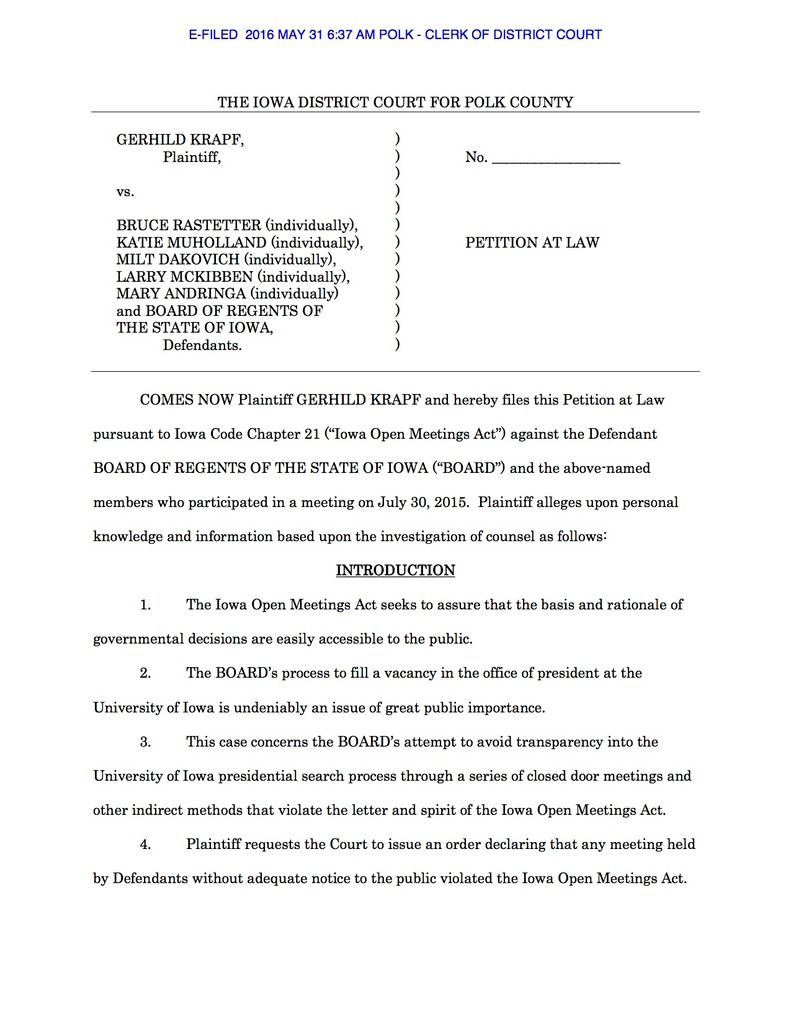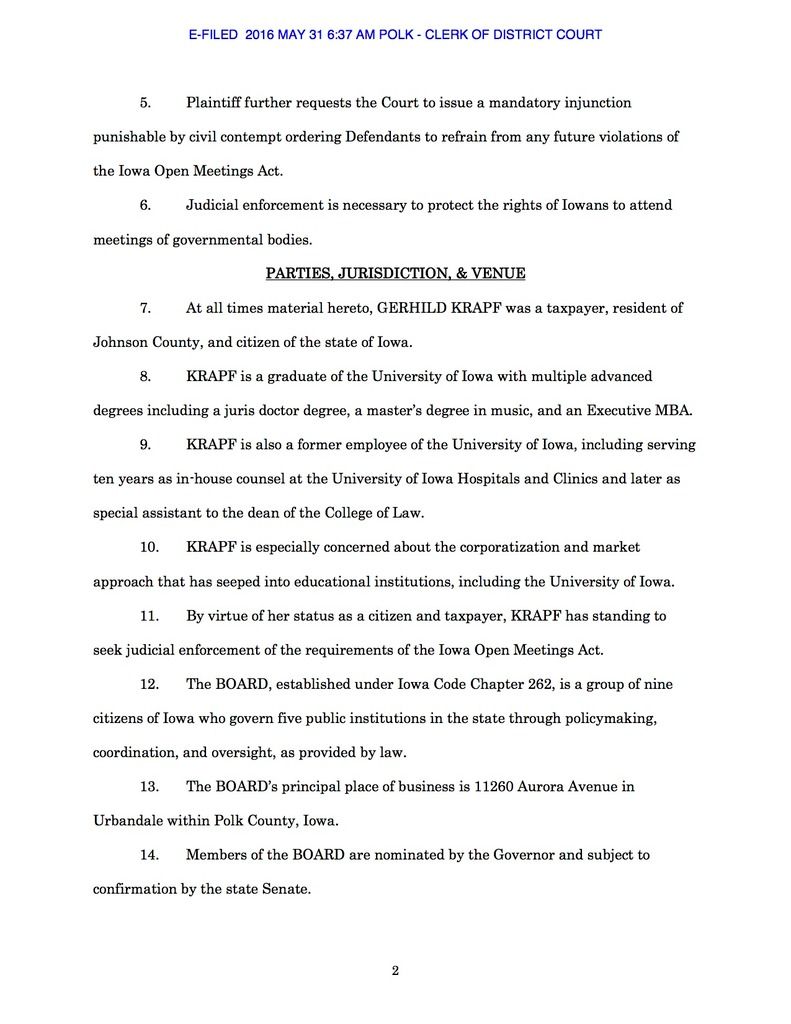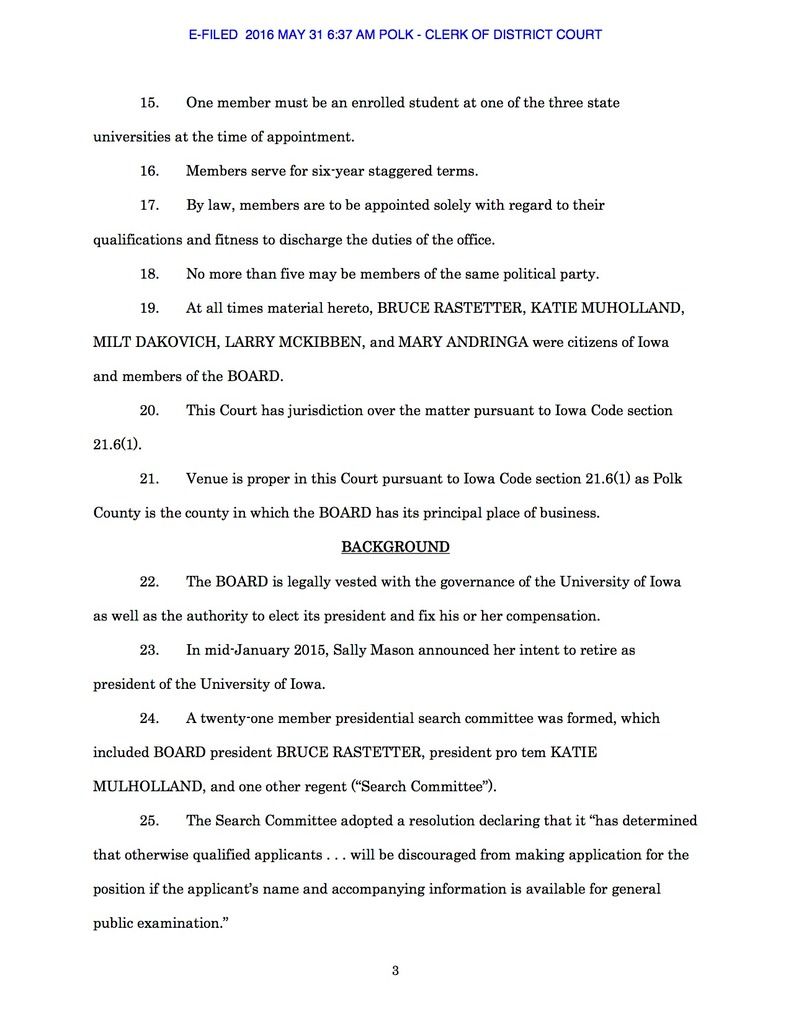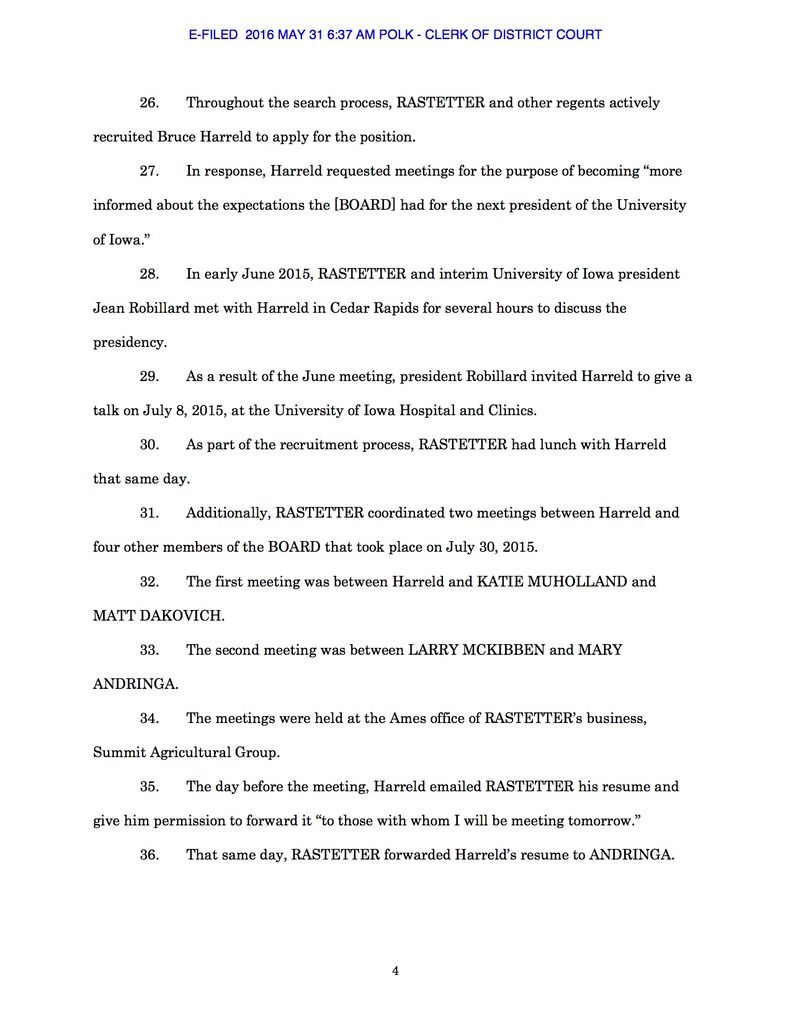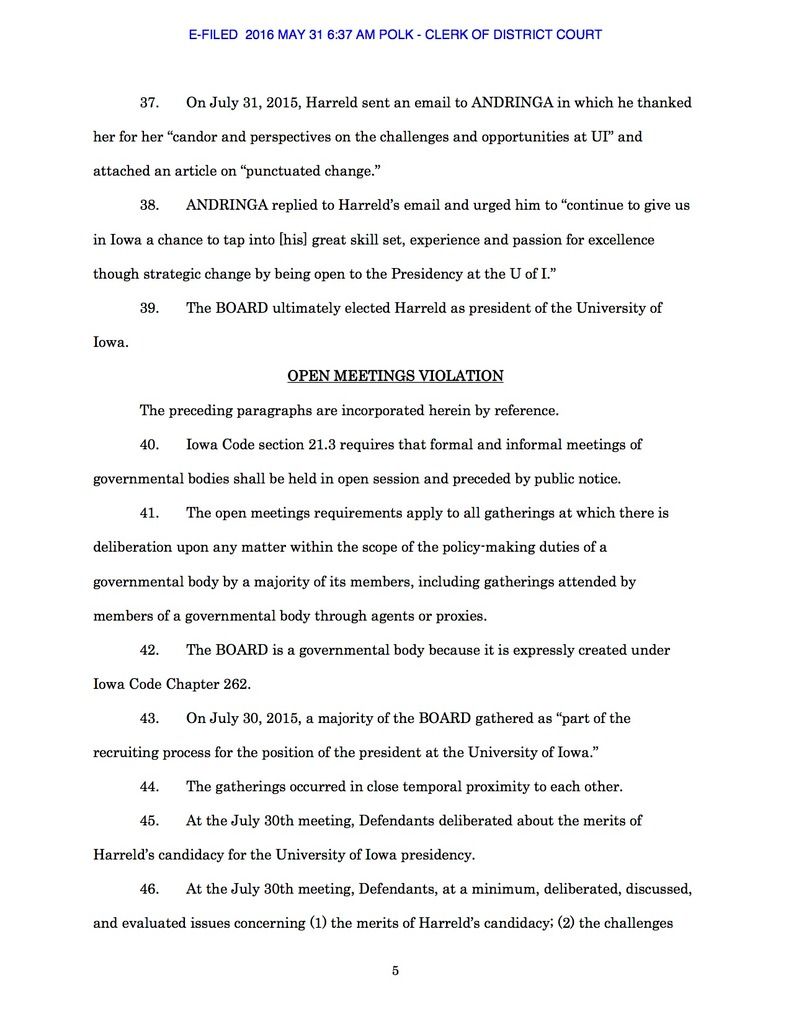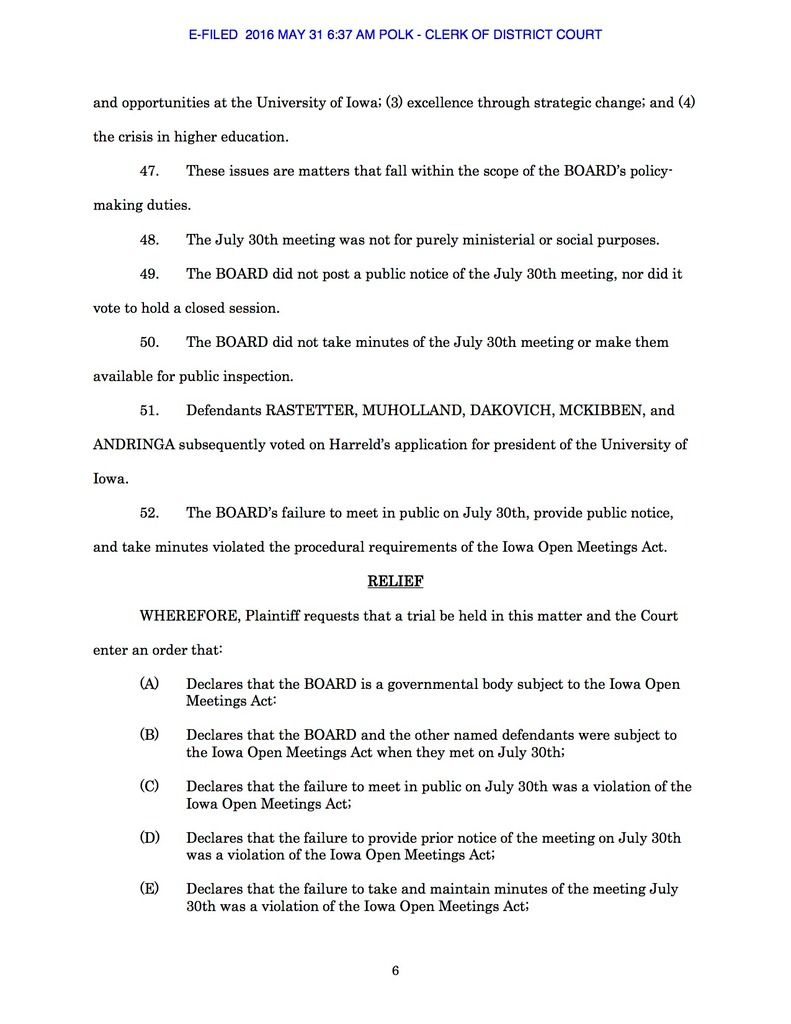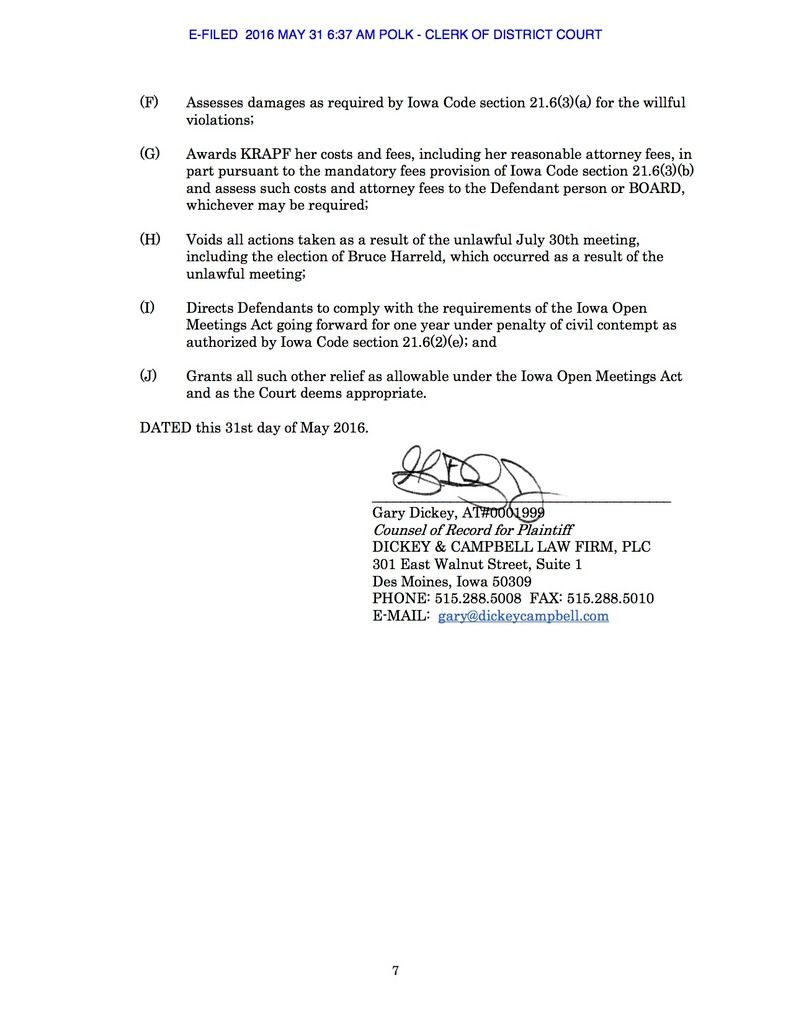A retired University of Iowa employee has filed suit to nullify last year’s hiring of University President Bruce Harreld, on the grounds that five members of the Iowa Board of Regents violated the state’s open meetings law, Ryan Foley reported yesterday for the Associated Press.
I enclose below more background on the case as well as the full text of the plaintiff’s court filing.
Gerhild Krapf’s lawsuit focuses on meetings that took place in Ames last July 30. Key insiders including Board of Regents President Bruce Rastetter, interim university president and search committee leader Jean Robillard, and major donor Jerre Stead had been recruiting Harreld for months. Before deciding whether to apply for the job, Harreld wanted to meet with members of the Board of Regents, which oversees Iowa’s state universities, as well as with Iowa State University President Steven Leath.
The Ames meetings were kept secret, even from other members of the Board of Regents, until late September, three weeks after the regents picked Harreld. The revelation (along with other news of previously undisclosed meetings) fueled suspicions that the fix was in for Harreld and that the Board of Regents had acted “in bad faith” throughout the search process.
According to news reports and Krapf’s petition, Rastetter arranged for Harreld to meet with other regents on July 30 at the office of Rastetter’s company Summit Agricultural Group. First Harreld met Regents President Pro-tem Katie Mulholland and board member Milt Dakovich. Later the same day, he met board members Larry McKibben and Mary Andringa. Rastetter, Mulholland, and Dakovich served on the 21-member presidential search committee; McKibben and Andringa did not. (Andringa has since resigned from the board.) All five regents are named defendants in Krapf’s lawsuit, as is the Board of Regents as a whole.
The plaintiff argues that the board “tried to avoid transparency” in the presidential search “through a series of closed door meetings and other indirect methods that violate the letter and spirit of the Iowa Open Meetings Act,” which “seeks to assure that the basis and rationale of governmental decisions are easily accessible to the public.” Rastetter reportedly did not attend the Ames meetings, ostensibly because of “other commitments” but more likely because the presence of a majority of the regents (five of the nine board members) would have triggered open meetings law requirements.
Nevertheless, Krapf’s petition asserts that Rastetter was involved in the Ames gatherings at his office, having “coordinated” them and forwarded Harreld’s resume to Andringa on July 29 shortly after receiving it from the presidential prospect. From pages 5 and 6 of the petition:
43. On July 30, 2015, a majority of the BOARD gathered as “part of the recruiting process for the position of the president at the University of Iowa.”
44. The gatherings occurred in close temporal proximity to each other.
45. At the July 30th meeting, Defendants deliberated about the merits of Harreld’s candidacy for the University of Iowa presidency.
46. At the July 30th meeting, Defendants, at a minimum, deliberated, discussed and evaluated issues concerning (1) the merits of Harreld’s candidacy; (2) the challenges and opportunities at the University of Iowa; (3) excellence through strategic change; and (4) the crisis in higher education.
47. These issues are matters that fall within the scope of the BOARD’s policy-making duties.
48. The July 30th meeting was not for purely ministerial or social purposes.
49. The BOARD did not post a public notice of the July 30th meeting, nor did it vote to hold a closed session.
50. The BOARD did not take minutes of the July 30th meeting or make them available for public purposes.
51. Defendands RASTETTER, MULHOLLAND, DAKOVICH, MCKIBBEN, and ANDRINGA subsequently voted on Harreld’s application for president of the University of Iowa.
52. The BOARD’s failure to meet in public on July 30th, provide public notice, and take minutes violated the procedural requirements of the Iowa Open Meetings Act.
Iowa Code Chapter 21 sets out open meetings rules and defines a meeting as follows:
“Meeting” means a gathering in person or by electronic means, formal or informal, of a majority of the members of a governmental body where there is deliberation or action upon any matter within the scope of the governmental body’s policy-making duties. Meetings shall not include a gathering of members of a governmental body for purely ministerial or social purposes when there is no discussion of policy or no intent to avoid the purposes of this chapter.
One key question for the Polk County District Court to decide will be whether the Ames meetings were scheduled with intent to get around state law.
In the Iowa Supreme Court’s most recent ruling related to this issue, four justices rejected a scheme designed by Warren County supervisors for the express purpose of evading open meetings requirements. The majority decision in Hutchison v. Shull can be found here. Bleeding Heartland posted key passages here.
Foley reported yesterday,
“If there was a conscious effort to circumvent the law, then the public should know,” said Krapf, who retired last year as special assistant to the law school dean. “I think that the search was incredibly flawed … It was not only a waste of tax dollars, it was an insult and a black mark on this university.” […]
The case may build on a recent Iowa Supreme Court decision that found private meetings can be illegal even when a majority of board members aren’t physically present. The court held that any meeting called to discuss policy in which a majority of members attend “by virtue of an agent or proxy” — such as a staff member — is subject to the law.
Unless evidence emerges that University of Iowa or Board of Regents staff were present at Harreld’s secret meetings in Ames, I don’t see a direct connection between the Krapf lawsuit and the Hutchison case. Warren County supervisors used a staff member as a conduit so that they could communicate with each other and deliberate on policy without being in the same room or on the same e-mail chain.
In contrast, Harreld’s July 30 meetings with Mulholland and Dakovich, then with Andringa and McKibben, and possibly at a different time with Rastetter, sound more like a so-called “walking quorum” approach to avoiding an open meeting. Iowa school boards and other governmental bodies have discussed public policy decisions in “walking quorums” for decades. Although the Iowa Association of School Boards discourages that approach, neither the state legislature nor the Iowa Supreme Court has moved to ban the practice.
Point 44 of the plaintiff’s filing (“The gatherings occurred in close temporal proximity to each other”) is important because the majority ruling in Hutchison did not overturn the Iowa Supreme Court’s unanimous 1980 ruling in Telegraph Herald, Inc. v City of Dubuque. In that case, seven justices agreed Iowa law allows a series of private, in-person gatherings of less than a majority of a board’s members. Writing for the majority in Hutchison, Justice David Wiggins noted (pages 18 and 19),
In Telegraph Herald, we recognized the “legislature’s apparent intent that temporal proximity exist among members of the governmental body” in order for a “meeting” subject to the open meetings requirements to take place. Id. at 534. However, the question we faced in that case is distinguishable from the question we face in this case. In the former, we considered whether an open meetings violation occurred when members of a city council interviewed applicants for the position of city manager during a series of gatherings at which less than a majority of the council members were present at various times and places. […]
We concluded [in Telegraph Herald] the serial submajority gatherings did not violate the open meetings law because they did not constitute gatherings to which open meetings requirements applied for two reasons. First, the council members obviously did not deliberate regarding whom they would actually hire during the interviews.1 Id. at 532–33. Second, in interpreting section 21.2(2), we concluded that in order for serial submajority gatherings to collectively constitute a meeting of the majority of a governmental body and trigger the open meetings requirements, a majority of the members must deliberate in temporal proximity to each other. Id. at 533–34. Because there was no demonstration of temporal proximity among the gatherings at which the interviews took place, we concluded they did not trigger the open meetings requirements.
Clearly last summer’s meetings in Ames occurred “in temporal proximity.” Whether they included a majority of the Board of Regents depends on whether Rastetter was truly absent that day, or met with Harreld some time shortly before or after Mulholland, Dakovich, McKibben, and Andringa did.
Not long after the Iowa Supreme Court announced its decision in Hutchison, Rastetter said during an Iowa Public Television program,
“We’re trying to get clarity on the decision, because we want to make sure that we’re operating under the law,” Rastetter says. […]
Rastetter says he’s unsure now whether conversations board members may have individually with the board’s executive director might violate the guidelines in the Supreme Court’s ruling — if those individual conversations cover the same topic.
“I think it’s going to be a problem and I think our lawyers or the state needs to clarify exactly what it means on how we’re going to operate because we want to do things within the law,” Rastetter says. “But we also want to be able to have normal, practical conversations on how you make improvement.”
Note that Rastetter is talking about staff members being used as proxies for board deliberations. Krapf is asking a court to find that a majority of the regents themselves violated the open meetings law.
Her lawsuit is unlikely to succeed in voiding Harreld’s hire and will certainly not be resolved before the Regents choose a successor to departing University of Northern Iowa President William Ruud. Rastetter has not committed to an open search for that position. Speaking to the Des Moines Register’s editorial board in March, he suggested that “private searches” for university presidents might be justified to obtain “the absolute best outcome.” He claimed qualified candidates had decided against applying to lead Iowa universities so as not to endanger their current jobs.
Any relevant comments are welcome in this thread.
P.S.- In typical Cedar Rapids Gazette fashion, Vanessa Miller reported on Krapf’s lawsuit yesterday without mentioning that the Associated Press had broken the news several hours earlier.
P.P.S- A separate lawsuit filed last year also cited alleged violations of open meetings law during the University of Iowa presidential search, but that claim focused on the actions of the search committee, not the Board of Regents. Foley reported last September,
[Emeritus Professor Harrold] Hammond’s petition alleges the [University of Iowa presidential] search committee held meetings that were improperly closed and in locations that were inaccessible to the public. Among others, the lawsuit challenges two days of closed interviews the committee conducted with nine finalists last month at a hotel near a Chicago airport.
UPDATE: Via Ditchwalk, supporters of this lawsuit can donate to the Gerhild Krapf Legal Fund.


